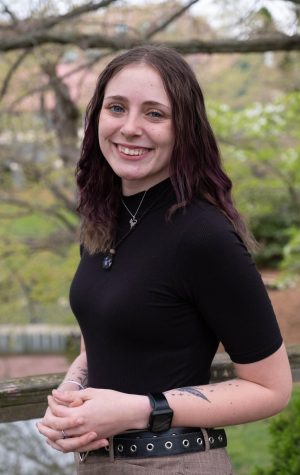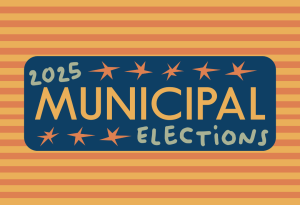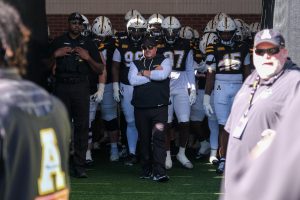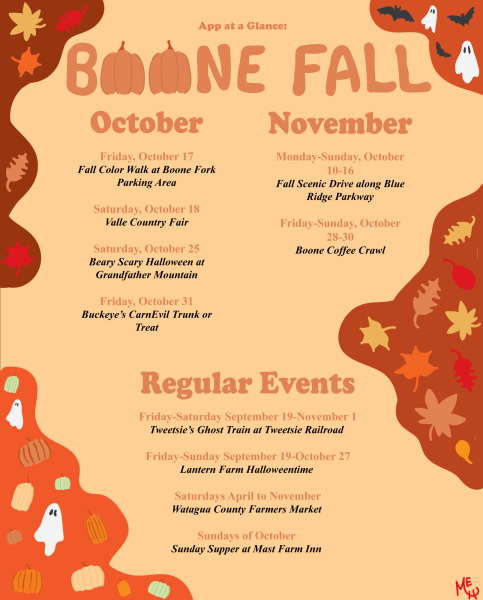Seniors ahead of the curve: Accelerated Master’s Program
May 2, 2023
At 16 years old, before even touring campus, Erin Barnette attended an open house at App State where she met with Reich College of Education staff. This staff described an accelerated master’s program, at the time called the 4+1 Program, which is now formally titled Accelerated Master’s.
Barnette is now a senior special education major in the program, and will graduate this May with her bachelor’s degree.
“I was, like, ‘Oh, that’s kind of a neat opportunity,’” Barnette said. “Time effective, and saves some money by taking grad classes at an undergraduate rate, getting it down in a year.”
Since she learned about it at the open house, her ambitions to gain admission to the program have been “in the works.”
Barnette came to the university for its top undergraduate teacher preparation program, and her current goal is to work as a lead teacher in exceptional children’s teaching.
“It seemed like a good fit,” Barnette said. “I knew about this program, so I said I am gonna go and do the five years and teach, that was always the plan.”
The Accelerated Master’s Applicant website says, “If you are accepted into the Accelerated Master’s program, you will be tentatively admitted into the Graduate School. You will then be granted access to register for graduate-level classes while still enrolled as an undergraduate.”
This semester, Barnette is a senior and taking her fourth class in the program for dual credit toward both her undergraduate and graduate degree.
“I did my planning correctly so I will take some more this summer, take some in the fall and the spring and be done in a year,” she said.
Barnette said working toward her master’s degree as an undergraduate student makes her excited for graduation.
“It helps the momentum of being a student, keeps the ball rolling, and I have not tired out yet,” Barnette said. “I do not have senioritis, because I am continuing.”
Barnette said last spring, as a junior, when her peers were considering the program, she had already applied and drafted a schedule a year prior to taking courses.
Her peers received exposure to the program through a professor in one of her classes.
“She said ‘Hey, do you guys want to do this?’ and they were like absolutely not,” Barnette said. “Then, the more she started to talk to people and I started to talk to people, we gathered nine of us.”
Barnette said she is still actively trying to recruit people into the program along with her professor.
“It is a really good thing to start thinking about it before you are a senior, so you are not rolled up into the, ‘I just want to get a job and get out of school,’” Barnette said.
To continue with the program, you have to like school and have a strong desire to succeed in your educational pursuits, she said.
“I am okay with my role as a student right now. I want to continue to learn,” Barnette said.
In the spring of her junior year, Katherine Sumrell, a senior reading education major, said she learned about the Accelerated Master’s program through a professor teaching an undergraduate course who highly recommended it.
“I think that the initial appeal was that it was only a year and that I could start it during undergrad and save money and not have to worry about going back to school,” Sumrell said.
After she applied, Sumrell was unsure whether to enroll in the program and pursue her master’s or graduate with a bachelor’s degree. However, she explained the opportunity is once in a lifetime.
“So I thought, I may as well. And I do not regret it at all,” Sumrell said. “It was a really good decision for me.”
Sumrell said people in the program, professors and directors “have been so supportive.”
As she has continued further into her journey in the program, Sumrell said her initial interest in her pathway has led to a genuine passion for education and deeper understanding of the elementary careers out there.
“It has encouraged me to change paths, and maybe become a reading specialist versus an elementary teacher,” she said.
The ability to start on her master’s degree during undergrad made her “a lot less stressed than some other people in applying to grad school,” Sumrell said.
The application process for Accelerated Master’s is “comparatively easier”, she said as the application process does not include the Graduate Record Exam Test.
“I would encourage everyone to apply, or at least think about it,” Sumrell said. “It is a really good program.”
The program was new when Victoria Carlberg, the associate director of graduate admissions, assumed her role with graduate admissions.
“It was just a handful of programs, it was in its super infancy,” Carlberg said. “There has been a lot of evolvement with the program as the needs of the students have changed, the needs of the programs have changed, and just with changes in higher ed as a whole.”
The program has gone through a few title changes.
“We used to call it a 4+1 Program, but the reality was not everyone was finishing in five years,” Carlberg said. “So it was not very accurate.”
The program was renamed Accelerated Admissions before it assumed its current title of Accelerated Master’s program.
“We flipped it to Accelerated Master’s because you have the potential to finish your master’s early, while you are also gaining early acceptance into graduate school,” Carlberg said.
Carlberg said certain programs like Reading Education are more popular than others. As her team educates undergraduate students and advisers and faculty, they are able “to find pathways, which do not normally align.”
For example, a communication major may need another applicable path engineered, as there is no current accelerated or graduate program for communication majors, according to Accelerated Master’s.
“So we ask, what other pathways may apply?” Carlberg said. “As those talks are happening, you can see that the interest is picking up. We definitely have a steady applicant base, but I am seeing it grow in other areas from other majors.”
Carlberg said traditional first-year applicants apply to the program as juniors, but apply “for the future.”
Carlberg said that transfers are still able to complete the program but the timeline may look different depending on how their previous credits transferred and how much coursework they have left.
“Graduate school seems so far away, until you start laying out the path,” Carlberg said.
She said they didn’t have this type of program to save money on when she was younger so she “strongly encourages” it.


















